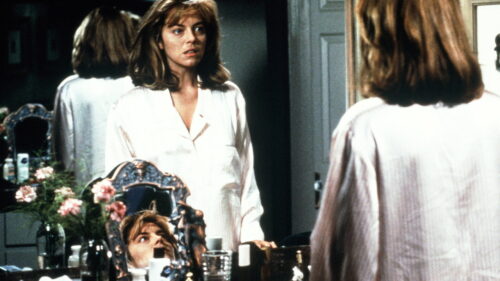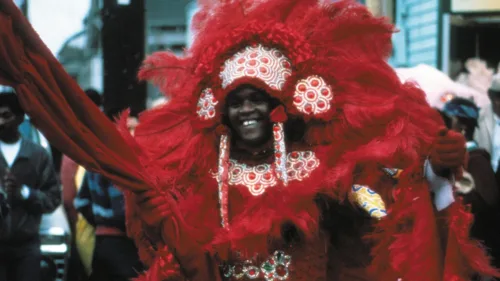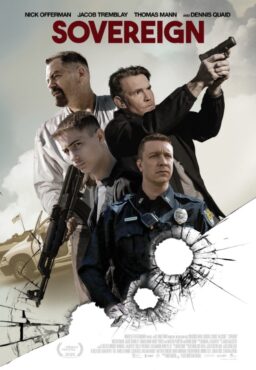The flowers at the top of this page are for Scott Schuldt, an American film critic and political blogger who mostly wrote under the name Edward “Ed” Copeland. He died on New Year’s Eve, 2015, after a long struggle with multiple sclerosis that had left him bedridden since 2008. At Scott’s request, there will be no funeral or memorial service.
I knew Scott, as I will call him from here on, for nearly thirty years. He was a friend of my late wife Jennifer Dawson; they went to high school together in Oklahoma City. Scott was a very tall (probably six-foot-four) dark-haired guy who looked a little bit like Alan Ruck in “Ferris Bueller's Day Off,” but heavier. He had a reedy voice and would fill awkward pauses in conversations with a drawled-out “Weellllllll” or “Aaaaaany-way.”
Scott was a prolific writer who worked as a copy editor at the Daily Oklahoman and, briefly in the aughts, at the Jersey Journal, during a relocation that was mainly intended to get closer to Broadway (he loved musical theater) and, not coincidentally, to Jennifer and me, and our daughter. Scott had started writing film criticism at the Oklahoman but returned to it when he went back home sometime around 2005, when his MS made it hard for him to live by himself on the East Coast. He moved in with his parents, who took care of him until his death. A few years ago they relocated from Oklahoma City to Indianapolis to be closer to their extended family. Scott died there, in Indianapolis.
Scott told me that he started blogging under the pseudonym Edward Copeland because the Oklahoman didn’t allow its writers to publish work outside of the paper without permission. I never believed that was the only reason. Ed Copeland was an alter ego that Scott needed to create sooner or later. Really, the illness gave birth to Ed.
Ed was more eloquent, stronger, more assured, and at times blistering as a writer than Scott Schuldt. He had a don’t-give-a-damn attitude. For a long time Edward Copeland’s avatar was an image of George Carlin blowing a raspberry.
For a number of years, Scott had a political blog and a film and TV blog. He later combined them under the name Edward Copeland’s Tangents, while continuing to contribute to other publications, including this 2009 piece about the inaguration of President Barack Obama, which contains an aside about how he credited Jennifer with turning him into a Democrat. I threw links to Scott at my first blog, The House Next Door, and asked him to write freelance pieces for my second blog, Indiewire’s Press Play. Scott’s alter ego was known for his ferociously detailed and impeccably researched articles on film and TV history, particularly his Oscar polls, such as this one choosing the worst of the Best Picture winners.
Longtime readers of RogerEbert.com might recognize Edward Copeland’s byline. He was one of the film writers that Roger supported by way of Twitter and Facebook links and occasional freelance assignments. (His page is here.) Roger had no idea that Ed was bedridden when they first became friends, but once he found out, he began emailing him regularly, inquiring about his health, swapping medical war stories, and offering him more work, which Ed/Scott usually declined because he admired Roger and didn’t want to blow any deadlines due to his medical problems.
As Scott’s illness became more debilitating, he sometimes wrote about his medical struggles in posts that were often so angry that it was hard to tell which of his complaints were legitimate and which were him understandably venting against circumstances so horrendous that I can’t imagine living through them myself. His troubles would often show up as asides in his writing. His piece on “The Golden Girls” ended with, “It was my extended time in hospitals when ‘The Golden Girls’ really came to mean a lot to me. One hospital had lousy TV choices (its only cable news channel was Fox, which to me would threaten its religiously-affiliated nonprofit status. Have no fear. I reported them. 🙂 ) so the frequent reruns of ‘The Golden Girls’ were a lifeline to me. I’d see the same episodes multiple times, but it didn’t matter. The girls gave me some comfort through a particularly hard time.”
When he got around to reviewing the fourth and final season of David Simon’s series ‘Treme,’ he included an aside about his illness, to explain why it took so long for him to post a new piece; this gave way to a lament for the ambulatory life that he could no longer experience: “My return to recapping ‘Treme’ episodes comes after sitting out Season 3 (and post-episode summaries/reviews of ‘Boardwalk Empire‘ as well) due to worsening aspects of the physical limitations associated with my primary progressive multiple sclerosis,” he wrote. “A major impediment to me continuing the recaps stemmed from the fact that my recaps of both series grew so insanely ambitious with research and links supplementing the general summary and assessment of each individual episode. In fact, I got so detailed when referring to neighborhoods and sections of New Orleans that some readers assumed that I either hailed from there or had lived in the city for a sizable portion of my life when I never got the chance to visit the Crescent City back when I was mobile.”
His review of the 2011 euthanasia documentary “How to Die in Oregon” was a combination critical evaluation and barely disguised health confession: “The entire health care industry, with the government as co-conspirators, opposes laws such as Death With Dignity because they want to bleed everyone dry first,” he wrote. ‘The system for people who are chronically ill but not terminal actually is set up so that you really can’t get financial help unless you are broke first. That’s what they want: It’s how the system is set up. Pardon my digression.”
He used to email me to tell me about typos or grammatical errors in published pieces. He was always the first to catch them. Often he caught things that working copy editors had missed. One time he called to tell me that he’d read a piece I wrote about “The Life Aquatic with Steve Zissou” and that I should be careful to proofread my book about Wes Anderson to make sure that “Moby-Dick” had a hyphen in it.
Scott’s health just got worse and worse over the years. He suffered from bedsores that became infected and which in turn created other health problems. He spent a lot of time in emergency rooms. After a while I lost track of all the surgeries he had.
For a long time he was able to type on a laptop, but at a certain point this became very difficult because he could not sit up straight in bed anymore; he had to figure out a way to type articles on a laptop while lying on his side. I can’t imagine how he did this, but he did it. At some point last year he stopped publishing new articles, and when that happened I figured it was only a matter of time. Scott lived to write. He told me many times that writing, and to a lesser but related extent, the movies and TV shows he loved to write about, were the only things keeping him alive.
I wish I could say that my friendship with Scott was purely pleasurable. It wasn’t.
Things were always awkward between me and Scott because he had been in unrequited love with Jennifer since they were teenagers. Jen had two serious boyfriends before me. They both had to accept Scott. One of them became very close to Scott, though they eventually had a falling out over politics (Scott was very liberal, Jen’s ex was very conservative.)
Scott believed (and he told me this flat-out one time) that he always hoped that he would end up with Jennifer. “You got the girl we all wanted,” he said after her death. He told me that the movie character he most strongly identified with was Albert Brooks in “Broadcast News,” who was in love with Holly Hunter but lost her to William Hurt (a charismatic idiot; I guess all of Jen’s significant others had to get used to the idea that they were the Hurt character).
Scott worshiped Jen, as did everyone; she was a great person, intelligent and kind, and a great friend, often to people who had few other friends. In the early years, when Scott simply rubbed me the wrong way, apart from the obvious reasons, I said, “I don’t understand how you can be friends with that guy. He’s just impossible.” She said, “He’s fine once you get to know him.”
I don’t think it was a coincidence that Scott’s illness began to worsen after Jen’s death in 2006. We had two memorials for her, one in New York City, where she and I and our kids were living at the time, and another in Jen and Scott’s hometown of Oklahoma City. Scott paid for the Oklahoma City memorial service and served as emcee. I all but begged him to let me pay for at least part of it but he refused. “This is on me,” he said.
He sent my children birthday cards and Christmas cards. My son was born in 2004, shortly before Scott moved back to Oklahoma City, and only saw him once more, in 2006 at the Oklahoma City memorial when he was two, so there was no way he could have remembered him, but he knew that twice a year he would get presents from his friend Scott.
Every year on the anniversary of Jen’s death, Scott would publish a blog post with no content save the image at the top of this page, and the phrase “No words.”
Scott was also a big fan of Francois Truffaut’s “Jules and Jim,” a drama about a love triangle. He mentioned it regularly in his writing, most recently in a 2012 series of blog posts tied into the film’s 50th anniversary, and published three days after the anniversary of Jennifer’s death.
“Truthfully,” he wrote, “I know the parallels my teen
eyes recognized between myself and others in my life then didn’t mirror
the characters on screen as closely as my imagination wanted to believe,
but as that fantasy faded away, I began to appreciate more of the
artistry of a film that I already loved.” This post eventually took a turn towards the self-lacerating, as many of Scott’s posts did during his long period of physical decline. “It’s a cliché, but it originates from truth: Most of the best art stems from suffering. … ‘Jules and Jim,’ for me at least, represents a cinematic temple to that idea. Of course, it also begs the question that if misery breeds great art, why in the hell haven’t I accomplished something of note?”
Ironically, and sadly, the depression, alienation and physical agony that Scott endured in his later years seemed to blind him to the fact that he had, during his relatively short time on earth, amassed an impressive body of scholarship and criticism. He often wrote very terse reviews, heavy on plot summary, but there would be a startling insight nestled in there, often at the end, summing up the film’s world view or its relationship to whatever genre it most exemplified.
Of David Mamet’s ‘Homicide,’ Scott wrote, “The title implies the aftermath of death, but ‘Homicide’ really depicts the consequences of confronting life and how one balances different and often conflicting priorities.” He wrote that Tim Burton’s “Ed Wood” “…could have turned out to be a sad story. As the end credits inform the audience that Wood became an alcoholic and died at 53, Depp’s beaming image smiles. They seem incongruous, but the film has exemplified the inexorable link between happiness and tragedy in the artistic process.” Scott’s appreciation of “All in the Family” summarizes the show’s many strengths better than almost any omnibus piece I can think of; it also persuasively draws a line of influence from Ralph Kramden of “The Honeymooners” through Archie Bunker and then Tony Soprano. He wrote appreciations of “Treme,” “Boardwalk Empire,” “The Larry Sanders Show,” “The Wire,” “The Sopranos” and “Deadwood,” among other acclaimed series, and they were always densely written and packed with details about the production, the source material (if any), the differences between various versions.
Scott wrote one of my favorite reviews of Martin Scorsese’s 1991 remake of “Cape Fear,” which he saw as an exceptionally brutal work-for-hire piece, personal mainly for how it articulated Scorsese’s irritation at having to make this kind of film to keep his hand in as an A-list director. “‘Cape Fear’ contains all his usual themes — guilt, religious allegory — but it’s colder,” he wrote. “It’s as if Scorsese not only singles out [David] Lynch for discussion but all films, including his own, and he’s not there to praise them. In that way, the film feels as if as, [while] Cady is taking revenge on the Bowdens, Scorsese is settling scores with the film industry. When the first notes of Elmer Bernstein’s reworking of Bernard Herrmann’s wonderfully overblown score from the original play, you get the sense that Scorsese has embarked on a satirical sucker punch disguised as a conventional thriller.”
His extended piece on “Jules and Jim” is another gem, mixing astute criticism and an eye for historical detail with observations that struck his friends as deeply personal disclosures. “While for me, ‘Jules and Jim’ stands at the high watermark of the French New Wave, I know many others won’t agree, and when you look objectively at the story of ‘Jules and Jim,’ it may employ many of that movement’s techniques, but many aspects of Truffaut’s film set it apart from its cinematic brethren such as its period setting and a time span that covers more than two decades. ‘Jules and Jim’ also caused moral uproars about the open relationships among the various characters in the film (and though Jules, Jim and Catherine might be involved simultaneously, they never took part in a ménage à trois). In a funny way, the 1962 film forecast the free love movement to come later that decade except its source material happened to be a semiautobiographical novel set in the early part of the 20th century. The prurience though lies in the mind of the fuddy duddy because part of what makes ‘Jules and Jim’ so special comes from Truffaut’s refusal to pass any judgment, be it positive or negative, upon the behavior of his characters. Despite the director’s own criticism many years down the road that the film isn’t cruel enough when it comes to love, the three main characters do suffer by the end but he doesn’t paint it as punishment for their sins.”
I was not as good a friend to Scott as I should have been. In fact during the last two years of his life I was a poor friend. It wasn’t the awkward personal history that came between us. I never really cared about that after Jen died, because it was great to know somebody who loved Jen as much as I did.
What came between us was Scott’s illness, and my squeamishness about it.
I lost my wife, my best friend and my stepmother in the span of three years, in my thirties. I have more experience with death than some people my age. But Scott’s physical deterioration was still too much for me, unflappable as I liked to fantasize that I was. The bedsores and infections and kidney stones, the surgeries, the delirium brought on by the pain medications, all warped his personality, which was prickly to start with, and made him angry and self-pitying.
That he had every right to feel those feelings didn’t make it easier to talk to him. He told me the doctors had it in for him. They were idiots. The nurses were idiots. They were incompetent. They were all trying to kill him. That sort of thing.
Scott told me on more than one occasion that he wished he knew somebody who would buy him a shotgun and a single shell and then help him raise it the barrel and put it under his chin and guide his hand to the trigger, because he couldn’t stand any of it anymore. The pain.
“I’m just so lonely,” he cried to me once, “and I can’t write anymore.”
He asked me one time if I would kill him. I told him that I would if I knew how to do it without anyone finding out it was murder, but because I had no practical idea how to do that kind of thing, and was probably too incompetent to do it without being found out and losing my kids, it wasn’t going to happen. “And what am I going to do, Scott?” I asked him. “Fly in and out of Indianapolis and mercy-kill you?” He told me he didn’t seriously expect me to kill him but appreciated the sentiment. I later learned from friends that they had versions of this conversation with Scott. He was quite serious about wanting to kill himself. He just wanted the pain to end.
Scott wanted to talk to me more often than I wanted to talk to him. I was not strong enough to withstand the tirades against the doctors, the nurses, his parents, and often me, the one who was supposedly his friend but would take days or weeks to call him back. Sometimes he would get fed up and leave a message that made it sound as though he was at death’s door, and I would call him in guilty panic, and he would start talking about “Twin Peaks” or “St. Elsewhere” or the Oscar race or some other favorite topic; I would feel furious at having been manipulated in this way. Then I would feel guilty for feeling put out, considering how I’d been ducking him.
I was afraid to put myself in contact with that level of misery—a selfish decision that I know Jen wouldn’t have approved of. I was never as strong as she was, and I was never as good a friend to Scott as she was. I am not saying that looking for reassurance. It is fact.
I’m not the only person who couldn’t handle Scott’s rage and despair. It was volcanic. But that doesn’t excuse my absence.
Even so, Scott never stopped caring about the quality of his work and everyone else’s. One time about six months ago he called to chastise me for not calling him back fast enough, and along the way he let me know that a TV review I’d just published had a dropped close-parentheses mark at the end of the fourth paragraph.
John Lennon once said God was a concept by which we measure our pain. Scott is another. It sounds horrible, but there were times when I would look at what Scott was going through and think, You have no right to complain about anything. You can walk around and go to movies. You can still write. You don’t want to die because life is so painful. How shameful it is to think about him that way.
He was a brilliant, impossible, unlikable, lovable man. If there is a God, Scott is correcting His grammar.












